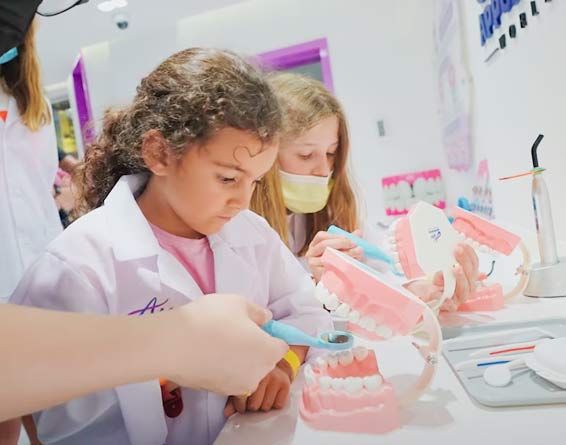Dental Hygiene for Children
Maintaining Good Oral Health
At Appolonia, we believe prevention is much more effective than intervention, especially in paediatric dentistry. Our top priority is to support you in creating healthy habits and maintaining good oral health.
Appolonia specialists will likely discuss your child's diet and oral hygiene habits and demonstrate proper brushing and flossing techniques.
When to start taking care of our children’s oral health?
Before the teeth erupt, clean the baby’s mouth and gums with a soft cloth or infant toothbrush at bath time. This helps the baby to have clean teeth when they erupt.
Once your child’s teeth begin erupting, you can begin cleaning them by wiping them with a moist washcloth at least twice a day. As your child gets more teeth, you can begin to use a soft child’s toothbrush. You should use just a rice-sized amount of tooth paste until your child is able to spit it out.
Tooth Brushing Instructions
Hold the brush at a 45 degrees angle towards teeth and gums. Move brush in round motion upper teeth clock wise lower teeth contra clock wise
- Brush the inside and outside surfaces of each tooth, top and bottom.
- Hold the brush flat on top of the teeth and brush the chewing surfaces.
- Gently brush the tongue to remove debris.
- Floss between teeth daily.
"Current recommendations encourage brushing for two minutes, twice per day."
If you spend less than two minutes brushing, you won’t remove as much plaque from your children’s teeth.
It is very important for your child to brush their tongue along with their teeth brushing routine. The tongue acts as a sponge and holds most of the bacteria in the mouth, thereafter it is very easy to spread to the rest of the teeth. So, brushing it off is mandatory to get rid of the bacteria that also causes bad odor.
Cavity Prevention
Most of the time cavities are due to a diet high in sugary foods and a lack of brushing.
Limiting sugar intake and brushing regularly, of course, can help. The longer it takes your child to chew their food, the longer the residue stays on their teeth and the greater the chances of getting cavities.
Some tips for cavity prevention:
- Limit frequency of meals and snacks.
- Encourage brushing, flossing, and rinsing.
- Watch what you drink.
- Avoid sticky foods.
- Choose nutritious snacks.






